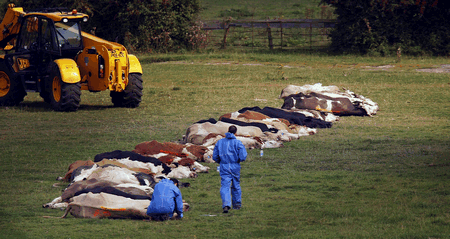Foot and mouth 2007 – the biggest crisis to hit farming in living memory?

Hundreds of miles away from the disease control zones and out of the media glare, the shockwaves of foot and mouth have rocked the livestock industry. Our north west of England correspondent Jeremy Hunt sets out the scale of the crisis facing British farming.
Unimaginable chaos, a scenario that every hill farmer would describe as “his worst nightmare”, has descended upon the uplands of the UK, writes Jeremy Hunt.
The national media has failed to comprehend – or portray to the general public – the severity and dire consequences of the national ban on livestock movements at this time of year.
I have been told this could yet prove to be the biggest crisis to hit farming in living memory.
But while the focus of media attention continues to be concerned with the hot-bed of foot and mouth infection that perhaps is still being nurtured by the water-courses of Surrey, an urgent solution must be found to alleviate the plight of our hill farmers.
As someone said to me this morning: “no matter how many times you look at this situation, each time you come up with another dire consequence.”

Throughout the hills, fells, mountains and uplands of the UK there are millions of head of cattle and sheep that have to be sold and moved. At the moment there appears to be no chance of that happening for some time – and it is certainly an element of the crisis that no national media reporter seems to have grasped.
Let’s look at breeding sheep. At the start of this week most hill farmers will have been banking on having a cheque in their hands within the next fortnight – a cheque that for many will have been their first real income for a year.
That cheque now looks like being as rare as hen’s teeth. At best, even if breeding sheep sales are permitted in say, six week’s time, it’s six weeks of extra borrowing that will be needed to keep farm businesses afloat. But the question remains – “is anyone going to want to buy these sheep in November?”
Even if they are forced to be held on hill farms, where is the keep going to come from to feed them? There’s no cash to buy feed and there will be no grass. What grass there will be is urgently needed for breeding ewes that will be going to the tup in October and November. So we are immediately into a major knock-on effect that’s on target to hit the 2008 breeding season.
Add to that the fact that hill flockmasters will not have been able to buy new tups, and it’s inevitable that ram power may well be much lower or of poorer quality.
Apart from the millions of breeding sheep now stranded on hill farms there are equal numbers of wether lambs – some of which would have been finished and others sold as stores. Their removal from high land is essential to alleviate pressure on grass which is just about to stop growing. And hill farmers who would have traditionally finished their wether lambs to try and bolster income will, now not be able to do so simply because there will be insufficient grass to do so.

The pedigree ram market is just about “goosed” for this year. If breeders get the green light to sell shearlings in November they will be about as worthless as Christmas puddings in January. Are we going to see a new trade for three-shear rams in 2008? I doubt it. So the financial loss to breeders who have been rearing tups for 18-months only to find that they now cannot sell them is mind-boggling.
The NFU and the Government needs to get together now to formulate a scheme that is going to get stock off the hills. This is not like 2001. Then you got the phone call from DEFRA, the men with guns came, you cried, and then the cheque arrived. At the moment there’s no cash, but there’s certainly going to be plenty of crying if something isn’t done soon.
Time is something hill farmers haven’t got; this is a situation that cannot be allowed to fester while the scientists stare down microscopes and Gordon Brown keeps telling us, so patronisingly, that he wants to help farmers by containing the outbreak.

If his Government doesn’t get a handle on the situation in the hills he will have an even more serious welfare issue to contend with than his pal Tony did in 2001 – not to mention a hill farming sector brought to its knees and starved of income.
The suckled calf situation is even more serious. Some gimmer lambs could, if it was deemed necessary, be killed and switched to the food chain (provided there was a compensation scheme for loss of value) but what about suckled calves? Tens of thousands of store cattle and calves must be moved off hill land in the next month. Most will be too young to move into the food chain; there isn’t the cash to feed them on hill farms nor the buildings to house them.
So all in all the entire hill sector is staring into an abyss. While the calm September weather may be suggesting that summer is still here in the north, you don’t have to be a cynic to know that weather-wise we are on borrowed time. If the unpredictability of our weather pattern should deliver its worst in the coming weeks the UK’s hill farming sector could face a catastrophe of unimaginable proportions.
Someone needs to come up with a plan.
